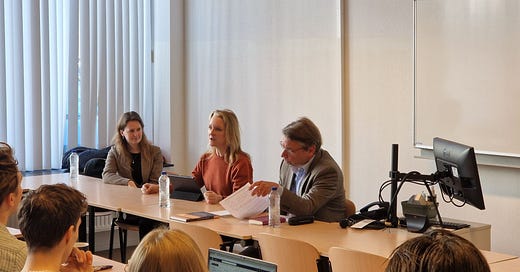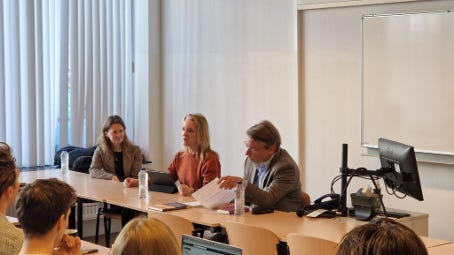On April 1, I participated in a panel discussion organized by my Leiden colleague, Dr. Luísa Netto, on the topic of democratic decline in the US and historical parallels in Europe. The other speakers were Dr. Marietta D.C. van der Tol (University of Cambridge) and Professor Kimberly Wehle (The University of Baltimore). A few days later, the formerly Protestant morning newspaper Trouw published a full-page interview with Staffan Lindberg, director of the research institute V-Dem. The interview was titled: ‘To what extent is the US still a democracy? There is a way to measure that.’ The opening lines read: ‘If things continue as they are, the United States will be an “electoral autocracy” by next year, according to political scientist Staffan Lindberg. “What is happening is reminiscent of the 1930s.”’
The V-Dem Institute publishes an annual democracy index, the methodology of which is severely criticized in a recent book by a leading German political scientist that I cited during the discussion. When I submitted an article on this subject to Trouw, the newspaper, after expressing interest in the draft, ultimately decided not to publish it. As I believe it nevertheless addresses the heart of the still-expanding debate about the relationship between the rule of law and democracy, below you find a slightly updated version of this apparently ‘forbidden opinion.’ For the permitted view on the topic, I refer to Professor Wehle’s response to a recent invited lecture, ‘What are we defending?’ by Steven Pinker, Professor of Experimental Psychology at Harvard University, at Leiden University on the evening of the opening day of the NATO summit in The Hague. Her comments start at around 59:00.1
Democratic erosion or democratic recovery?
Is democracy in danger? According to Staffan Lindberg, director of the research institute V-Dem, that is indeed the case. In Trouw of Saturday, April 5, he once again tells the standard story: democracy has been in decline in recent decades, and autocracy is advancing worldwide.
Lindberg focuses his argument on the United States, and here, too, it is certainly a standard narrative. The Trump administration poses a serious risk to the world’s leading democracy, and in fact, the country has already fallen into a constitutional crisis due to the measures taken in recent months.
In response to such analyses, Dutch scholars are reflecting on how to make democracy and the rule of law more resilient. The focus is thus on the consequences of ‘populism,’ while its causes receive less attention. To gain a clearer picture of the latter, it is necessary to view the resultant so-called democratic backsliding from a broader perspective.
German political scientist Philip Manow, for example, in his recent book Unter Beobachtung. Die Bestimmung der liberalen Demokratie und Ihre Freunde [Under Surveillance. The Determination of Liberal Democracy and Its Friends] suggests that there is reason to strongly question the methodology used for V-Dem’s influential democracy index.
The crux of the problem is that the index assumes a specific variant of the democratic constitutional state, namely liberal democracy. The characteristic feature of this liberal democracy is that it places the democratic pillar of the democratic rule of law under far-reaching and, so it seems ever-increasing scrutiny.
In his book, which focuses on Europe, Manow elaborates on this with respect to constitutional courts. Between 1990 and 1998, for instance, Hungary’s Constitutional Court was regarded as one of the most activist courts in the world. The challenged new Constitution, adopted in 2011 under Victor Orbán, was, in fact, an attempt to restore the balance of power.
In the Netherlands, where a constitutional court does not yet exist, the law generally plays a similar role. The fact that the now outgoing Schoof administration has, despite the adoption of two asylum laws by the Second Chamber on the last day before the Summer recess, hardly been able to implement any policy changes regarding immigration or nitrogen, for example, is partly due to the numerous European rules and international treaties to which the country is bound.
In the United States, too, there is a sense among part of the population that democracy has come under scrutiny, but from the expert-led administrative state. It explains why DOGE, rightly or wrongly and despite justified criticism of Elon Musk’s wielding of the blunt axe, could, in principle, count on support among a considerable segment of the population.
The American situation is all the more worrisome since recent empirical research shows that it is mainly the practically educated part of the population that is critical of this technocratic form of government. The problem of diploma democracy, familiar in Europe as well, thus also gives rise to opposing visions of democracy’s functioning.
The picture of democratic erosion at the hands of populist leaders, in short, needs to be supplemented at the very least. The fact that these leaders have gained influence in many Western countries is, at least in part, a result of the erosion of democracy prior to their rise. The transition to a form of democracy that is somehow put under surveillance, whether by constitutional courts, the law, or credentialed experts, can also be considered an autocratic move.
There is even a risk in portraying such a liberal democracy as the only acceptable form of democracy. If its policies become indeed opposed to the will of a majority of the people, the former could very well lose out. In European countries, it would then be better to reconsider the UN Refugee Convention, for example, or to reevaluate the European integration process.
What is essential is to avoid compromising the democratic rule of law. For that, it is paradoxically necessary to recognize the transformation it has undergone in recent decades into a liberal democracy. Rather than leading to an ‘electoral autocracy’ (Lindberg), the response to this development can itself be seen as democratic restoration.
I appreciate your interest in this Newsletter. A warm welcome to all new subscribers—this Newsletter now has over 1,130 subscribers and nearly 1,900 followers. It is read in 46 US states and 70 countries!
You can also follow me on X (@hmtennapel) for almost daily updates.
To learn more about my work, please visit https://hansmartientennapel.com.
Should you wish to support my valorizing activities or gain access to the archives, please consider a paid subscription to this Newsletter. It is greatly appreciated!
I will leave the contents of Professor Pinker’s lecture and his astonishing identification of the 1949 NATO Charter with Enlightenment principles, such as reason, science, humanism, and progress, for another time.






Interessant en leerzaam stuk weer, Hans-Martien! Ik ben je blijven volgen, ook nu CW Opinie uit de lucht is.
Hartelijke groet, Ineke Evink